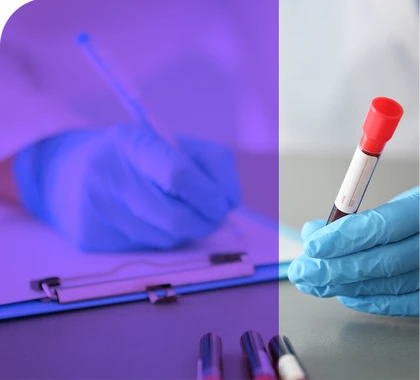CLSI was first accredited by ANSI in 1978 and is the sole nationally or internationally accredited Standards Development Organization (SDO) developing and revising AST interpretive criteria worldwide. CLSI antimicrobial susceptibility testing and performance standards can be used with confidence to identify and update susceptibility test interpretive criteria.
Specialty Areas
CLSI documents span a variety of topic areas covering all aspects of clinical laboratory testing, from laboratory basics to quality management systems. We have guidance for specific discipline areas and interactive tools and companion products to support implementation.

Microbiology
CLSI has a longstanding, globally recognized reputation for its diligent development of Microbiology and Antimicrobial Susceptibility Testing (AST) standards and guidelines for test methods and quality control procedures. Additionally, CLSI annually creates and revises AST breakpoints to meet global public health challenges related to antimicrobial resistance.
Method Evaluation
CLSI Method Evaluation Standards include detailed instructions, tools, and resources for the assessment of test method performance characteristics such a precision and accuracy. We provide the tools needed to comply with current best practices and regulatory and accreditation requirements.
Laboratory Developed Tests
In an effort to support LDTs subject to new regulatory oversight, CLSI has aggregated and adapted guidance and tools designed specifically for compliance. We have a dedicated advisory committee focused on the new US FDA regulatory requirements for LDTs and have developed new standards, tools, and education products designed to meet the needs of this community.

Quality Management
An effective Quality Management System is the cornerstone for the delivery of superior patient care and high-quality test results in the lab.
CLSI’s quality management standards cover a range of subjects, including management of laboratory documents, training and competency assessment, laboratory design, nonconforming event management, disaster planning, and continual improvement.

Automation and Informatics
Keep up-to-date with the latest advances in Information Technology for health care and the laboratory. CLSI’s automation standards and guidelines can help you improve patient care delivery by increasing your laboratory’s efficiency. Learn about information systems, data exchange, laboratory workflows and processes, and the use of artificial intelligence.
Clinical Chemistry and Toxicology
CLSI Chemistry and Toxicology standards focuses on proper method validation, accuracy, precision, and detection limits for clinical laboratory testing and assays, as well as standardized procedures for quality control, drug testing, toxicology assessments, specimen collection and transport, analysis, storage, and results reporting.
Hematology
CLSI’s Hematology standards provide guidance and recommendations for the proper collection, handling, storage, and testing of hematological specimens. These standards include recommendations for good laboratory practices related to analyzer and reagent performance, as well as information on quality assurance (QA) and quality control (QC) in the hematology laboratory.
Immunology and Ligand Assay
CLSI’s Immunology and Ligand Assay laboratory standards provide guidance on immunological assay test methods and techniques, including specimen collection, transport, preparation, interpretation, and quality assurance and validation approaches.
Molecular Diagnostics
CLSI offers standards on quality management and proficiency testing for the Molecular Diagnostics laboratory, as well as guidelines on the proper collection, transport, preparation, and storage of specimens. Learn about molecular diagnostic methods for identification of infectious diseases as well as oncological applications for molecular testing.
Newborn Screening
Early detection, diagnosis, and treatment of newborn diseases are critically important. Timely newborn screening can prevent death and improve patient care outcomes. CLSI Newborn Screening laboratory standards provide test collection instructions, as well as information on methods for the detection of metabolic and hereditary disorders.
Point-of-Care Testing
Point-of-Care Testing is increasingly becoming a more convenient alternative to traditional laboratory testing. Learn about best practice guidelines for point-of-care testing, how to set up and manage a point-of-care testing program in your facility, and how to reduce testing errors with CLSI’s point-of-care testing standards.
Preexamination Processes
CLSI's comprehensive preexamination process standards include proper handling of laboratory specimens, appropriate patient identification, establishment of clear protocols for test requisition and specimen collection, and more. With CLSI's standards, your laboratory can ensure patient safety and the overall quality of diagnostic outcomes.
Veterinary Medicine
CLSI provides trusted Veterinary Antimicrobial Susceptibility Testing (VAST) standards with guidance on quality control and testing methods. CLSI’s veterinary medicine standards can provide your laboratory with the information needed to comply and keep up-to-date with the latest best practice guidelines.

Led by Experts,
Vetted through Consensus.
CLSI brings together subject matter experts with diverse experience and professional backgrounds, from all around the world, to ensure that you get world-class international standards.